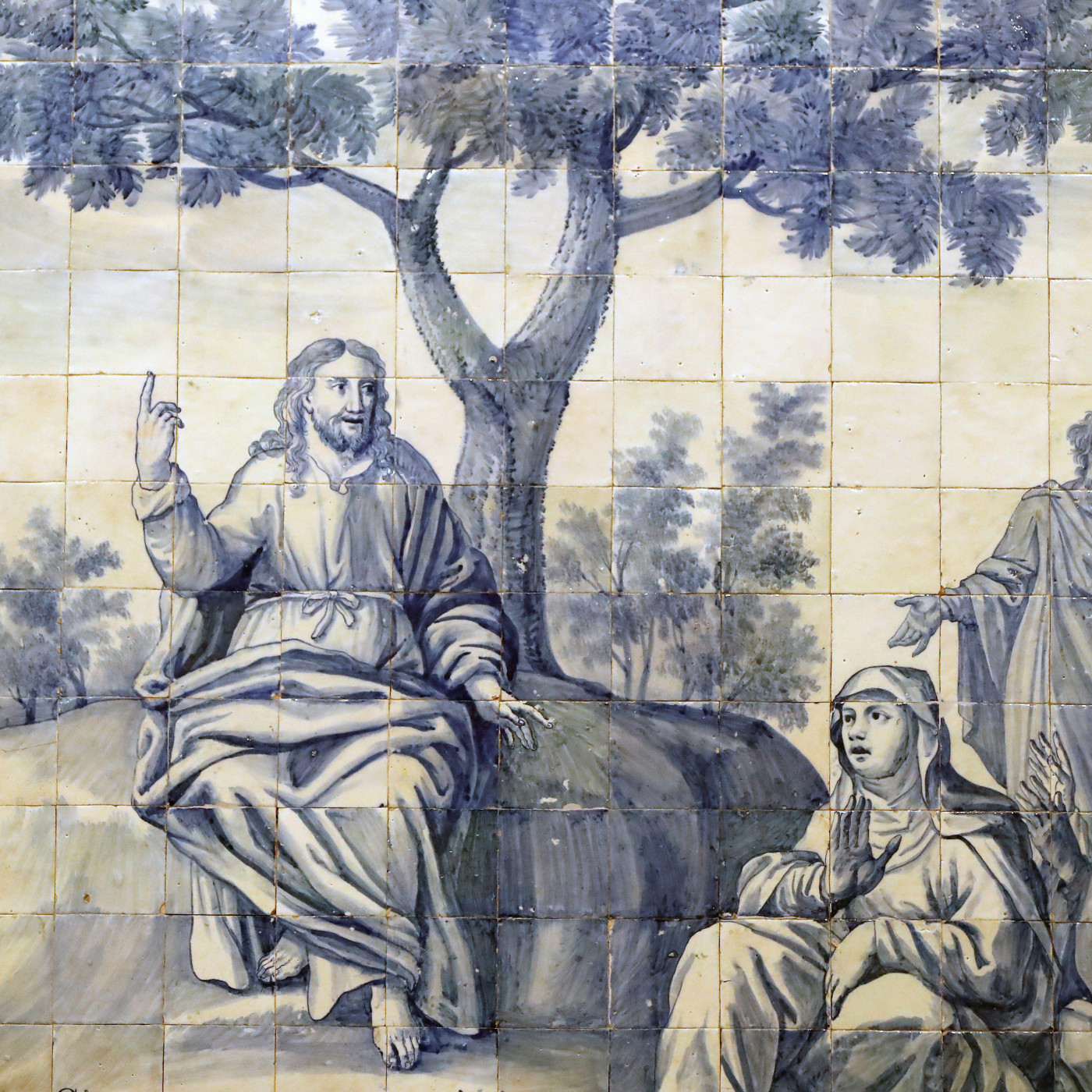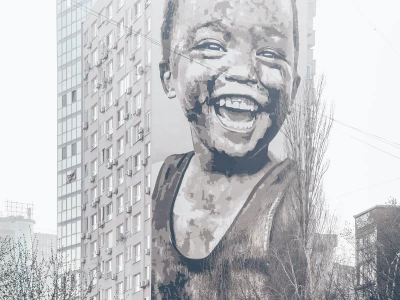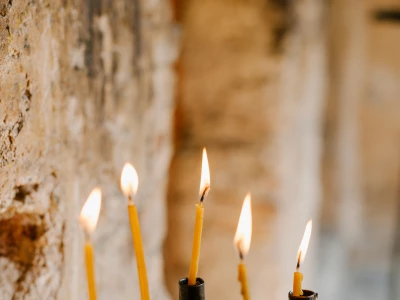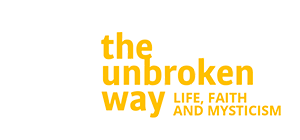Share this article
Upside-Down Happiness

Bumping into an outsider who sees the right way up
What if everything we think is back to front and the wrong way up? That we'll never find true happiness the way we look at things? Recently, I was mulling over this quandary while sitting outside a café when I spotted Franky, a friend of my nephew Robert. He was looking straight at me with a big, endearing smile. Franky and Robert are both in their late thirties with mild to moderate intellectual disability. However, their social and empathic skills are exceptional.
'How's things? I asked Franky
'I'm goin' to Medjugore with Robert and his mam next week,' he said, all animated. He wanted to keep the banter going and added, 'I pray for you and your wife every day.'
I had bumped into Franky over twelve months ago when I had shown him a photograph of my wife Solvita and me on our wedding day six years ago. He had never met her, but he still remembered her and prayed for her. 'Who'd do that?' I thought to myself. It's not as if I know him well —I only know him as Robert's friend. However, on the rare occasions I meet him, he transports me, just as Robert does, to a happier, lighter and more hopeful place. He has such an innocent, childlike and magical way of seeing the world. I was especially moved when I ran into him outside his home and asked him who he lived with. 'I used to live with my sister, but she's up in heaven now', he told me. I could see the love in his eyes for her.
Franky's lack of guile and thoughtfulness stayed with me as I cycled home. Like many obscure souls, I believe he is sending terrific amounts of God's light into the world and is entirely unaware of it.
'They should be picked up in a Rolls Royce'

'Unless you become like children'
—Matthew 18:3
The rich and famous are especially lauded, and we send limousines to pick them up at film festivals and the like. But those who suffer for higher causes are rarely recognized for their heroic sacrifices. Mercifully, this is not the case in God's world, which my late wife, Cushla, fully understood.
As a mystic blessed with extraordinary spiritual insight, Cushla didn't value others through the lens of fame, 'success', and productivity level. She understood that we were all created for something so much bigger than today's challenges and seemed to naturally maintain an upside-down perspective on society's outsiders, especially for Robert and her siblings Peter and Tricia.
Peter had developed schizophrenia in his twenties, and a few years later, he had to bear another cross when he suffered a stroke. Also in her twenties, Tricia, the youngest in the family, developed a rare neurological disorder, leading to muscular atrophy. The condition gradually worsened, resulting in Tricia using a wheelchair.
Although she bore her own debilitating illness for seventeen years, Cushla didn't become mired in the difficulty of life and made sure her family never wanted for anything. Once, when I praised her for her dedication in picking Peter up from his mental health workshops, she said to me:
'They should be all driven around in a Rolls Royce,' referring not only to Peter , Tricia, and Robert but all those who bore heavy crosses. From her enlightened perspective they were chosen souls suffering for a higher purpose and deserved what the world would never give them.
'My family were chosen to suffer,' she tried to explain to me one day. It was an enigmatic insight she received from one of her knowings* and mirrored Jesus' seemingly strange teachings in the Beatitudes.
The Sermon On The Mount—A Metaphysical Earthquake

'I so often use what the world considers weak'
Words from Jesus Christ received by Father John Woolley**, a former British hospital chaplain.
When Jesus entered our earthly realm, there was a metaphysical earthquake. His' upside-down teachings', especially the Beatitudes, which are part of his Sermon On The Mount, slowly altered our perception of human life.
The Beatitudes are Jesus's eight blessings and are essentially short but powerful descriptions of what it looks like to live life God's way:
Blessed are the poor in spirit, for theirs is the kingdom of heaven. Blessed are those who mourn, for they shall be comforted. Blessed are the meek, for they shall inherit the earth. Blessed are those who hunger and thirst for righteousness, for they shall be satisfied. Blessed are the merciful, for they shall obtain mercy. Blessed are the pure in heart, for they shall see God. Blessed are the peacemakers, for they shall be called sons of God. Blessed are those who are persecuted for righteousness' sake, for theirs is the kingdom of heaven. Blessed are you when men revile you and persecute you and utter all kinds of evil against you falsely on my account. Rejoice and be glad, for your reward is great in heaven.
The Catechism of the Catholic Church explains that The Beatitudes 'are the paradoxical promises that sustain hope in the midst of tribulation.' They seem foolish to the modern secular mind because they are the antithesis of everything that the world we live in tells us to believe: that to be happy, we have to have successful careers, lots of money, be physically attractive, etc
It seems that Jesus was trying to tell us that we must turn our thinking upside-down to find happiness. The evangelist Billy Graham says in his book, The Secret Of Happiness.
'We haven't learned the secret Jesus taught in the Beatitudes – that true, lasting happiness simply isn't to be found by seeking it directly. Happiness is a by-product, a bonus that comes when we seek what is really important. And the things that will bring us the satisfaction we long for are not necessarily what the world considers meaningful.'
Jesus did not have to have an outward stimulus to make Him happy, Billy Graham pointed out: 'He had learned a secret that allowed Him to live above the circumstances of life and fear of the future. He moved with calmness, certainty, and serenity through the most trying circumstances – even death! What was His secret? He gave it to us in the Beatitudes.'
Notes:
* Knowings. I don't mean knowing in the ordinary sense of the word. Cushla's knowings were, instead, a higher form of knowledge she drew from deep within her soul. It was a gift she shared with well-known mystics.
** During his work as a hospital chaplain, John Woolley received many words of divine encouragement from the Lord during prayer. He has passed on these 'heart whispers' in a series of titles which have inspired and uplifted tens of thousands and even changed their lives. I Am With You is my favourite, which I dip into every day.'
Share this article
Categories
in your inbox

Inspirational Lives









